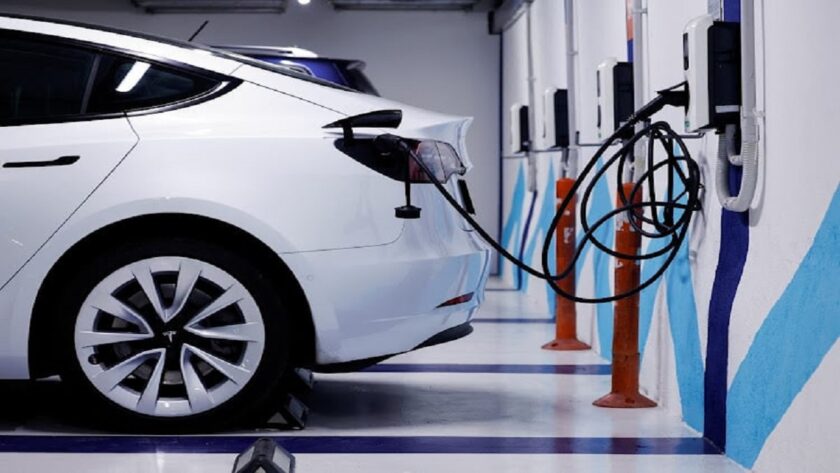Nigeria Needs Clear EV Charging Roadmap
Stakeholders in Nigeria’s energy and transport sectors on Wednesday said the country urgently needs a clear and realistic roadmap to develop a scalable electric vehicle (EV) charging network, if it must meet its mobility transition goals.
They made the call at the Abuja EV Stakeholders Roundtable Dialogue organised by the Clean Technology Hub in commemoration of the World Sustainable Transport Day.
The high-level dialogue is organised in partnership with the Policy Centre of the Abuja Chamber of Commerce and Industry (ACCI), the National Automotive Design and Development Council (NADDC), and Surge Africa.
The theme is “Advancing E-mobility Infrastructure in Nigeria: Unlocking Policy, Financing, and Technical Pathways for Scalable EV Charging”.
The event convened key government agencies, private sector leaders, development partners, investors, and technical experts to discuss Nigeria’s electric mobility transition with a focus on unlocking the charging infrastructure barrier.
Speaking, Mr Daramfon Bassey, Head of Programme, Energy Access at Clean Technology Hub, said the roundtable was built around three major questions.
These, he said, were policy shifts required to attract private sector investment, viable financing models in a high-cost, unstable grid environment, and the technical and institutional frameworks needed to build a network that was resilient and scalable.
He said the presence of government agencies, financiers, private companies and development partners reflected the understanding that no single institution could drive the transition independently.
According to him, the forum aims to produce a shared outlook for Nigeria’s EV charging ecosystem in the next decade.
“This includes concrete policy recommendations for regulators, practical financing and deployment models, and a stronger coalition committed to implementation.
“This dialogue is not about perfection but practical solutions that are realistic for Nigeria’s context and capable of long-term impact,” he maintained.
Bassey said that Nigeria was at a defining moment where policy direction and investment decisions would determine the future of its electric mobility transition.
He explained that Nigeria’s size as Africa’s biggest economy and population centre meant its EV transition would have structural, not symbolic, consequences for the continent.
He said although national policies showed ambition, the reality on the ground indicated that the EV charging ecosystem remained weak, fragmented and at a pilot stage, dominated by isolated government projects and small private deployments.
He noted that the Electric Vehicle Transition and Green Mobility Bill under review contained strong prospects, but warned that it required strengthening to address implementation gaps and local market realities.
According to him, Nigeria cannot replicate EV charging models from Europe, China or South Africa, given its unreliable national grid, non-EV-ready fuel stations, rapid urbanisation and limited electricity access for millions of citizens.
He, however, highlighted opportunities such as high solar potential, more than 100 mini-grids in operation, a large two- and three-wheeler mobility market and emerging local innovators in manufacturing, battery swapping and renewable energy.
“These conditions show that Nigeria’s EV charging growth will not rely on a centralised grid alone,” he said. Bassey urged participants to be honest, pragmatic and solution-driven as Nigeria positions itself for an inclusive, affordable and strategic EV future.
In his goodwill message, Prof. Innocent Barikor, the Director General (DG), National Environmental Standards and Regulations Enforcement Agency (NESREA), called for strict environmental safeguards as Nigeria accelerated its transition to electric mobility.
Barikor, who was represented by Mr Chukwura Nnandi-Okaybue, commended organisers and stakeholders for placing environmental governance at the centre of the electric mobility agenda.
According to him, electric mobility is no longer a peripheral conversation but one tied directly to Nigeria’s priorities on emissions reduction, air quality improvement, industrial competitiveness and public health.
He said NESREA, as the lead agency responsible for enforcing environmental laws and standards nationwide, had a clear mandate in shaping the environmental foundation of the country’s EV transition.
He explained that NESREA had already launched and was implementing the National Environmental (Battery Control) Regulations and the Extended Producer Responsibility (EPR) framework to ensure traceability, safe storage, environmentally sound recycling and pollution-free recovery of batteries.
He said Nigeria had the capacity to build an electric mobility ecosystem that protects the environment, strengthens public confidence and positions the country as a regional leader in clean transport.
He reaffirmed NESREA’s commitment to deploying its regulatory authority, technical capacity and enforcement mandate to support the national transition.
Also speaking, Ms Joan Bishop, Network Coordinator of the Youth Climate Collective, an Initiative of Surge Africa, expressed support for Nigeria’s efforts to expand electric vehicle (EV) infrastructure.
Bishop stressed that unlocking policy, financing, and technical pathways for scalable EV charging was the “critical first step” to making the vision a reality.
She commended the organisers for convening the dialogue and expressed confidence that collaborative efforts among government, industry, and civil society would accelerate progress toward a sustainable electric mobility ecosystem in the country.
“Together, let’s drive the future. We are urging participants to sustain momentum and practical solutions for Nigeria’s EV transition,” Bishop said. #Nigeria Needs Clear EV Charging Roadmap#
Naira Rises as Additional FX Inflow Boosts External Reserves

